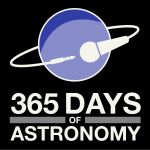Title: Galileo and His Lute
Podcaster: Mark Thompson
Organization: Galileo 1610 http://www.galileo1610.com/
Description: Music played not only a unique, but an essential role in leading Galileo to his new physics. Because it is an art demanding precise measurement and exact divisions, music reflected the spirit of Galileo’s science. This podcast includes two new original songs: “Steps of My Discovery” and “What Shall We Call My Instrument?”
Bio: Mark Thompson, a professional cantor and amateur astronomer, has appeared as Galileo on radio, at community theatres and libraries, public schools, colleges and universities throughout the country. He has performed as Galileo for civic organizations, astronomy association conventions, marketing and outreach programs as well as private events and parties since 1996.
Today’s sponsor: This episode of 365 Days of Astronomy is sponsored by Moreton Bay Regional Real Estate, Queensland, Australia, on the web at www.mbrrealestate.com.au, and is dedicated to Jonathan Bowden.
Transcript:
Music played not only a unique, but an essential role in leading Galileo to his new physics. Because it is an art demanding precise measurement and exact divisions, music reflected the spirit of Galileo’s science.
One of Galileo’s most important discoveries, the law of falling bodies, can actually be traced to his early musical experiments with his father, Vincenzo Galilei, a musicologist and lute virtuoso. Together, they discovered the motions of pendulums while measuring with weights, the tensions of lute strings.
Galileo was an outstanding lutenist himself, whose “charm of style and delicacy of touch” surpassed even that of his father. Playing the lute was a source of great pleasure and a special comfort to him in his final years, when blindness was added to the many other trials of his life.
It’s May 1609. Galileo is forty-five years old, the father of three illegitimate children; a burned-out financially strapped university math professor in Padua, who is desperately seeking patronage from the ruling Medici family in Florence, so he might return to his ancestral home with security.
He hears about an unusual optical device just invented in the Netherlands that is apparently able to render faraway things as though nearby.
Could we get a glimpse into the mind of a man whose destiny it was to be the first human being to assault the heavens with a telescope, and explain to the rest of us what he saw?
In his Starry Messenger, Galileo informs us:
“It was the summer of 1609 when on one of my trips to Venice, some startling news reached my ears. A spectacle maker in Holland had presented to Count Maurice of Nassau a glass, manufactured in such a way as to make distant objects appear very near, so that a man at the distance of two miles could be clearly seen. This seemed to me so marvelous an invention that I began to think about it. What if I could make such a device—only more powerful? It appeared to me to have a foundation in the science of perspective. Once again I turned to my lute for inspiration as I contemplated such an instrument.”
Dear loyal listeners, you are about to hear for the first time ever an ancient recording recently unearthed in the Vatican archives—yes, of the great Galileo himself—alone in his study, alone except for his constant companion, his faithful lute—the one built for him by Wendelio Venere in Padua in 1582— listen in—as we discover for the first time how Galileo and his lute together used music to inspire the creation of his own device that would bring him immortal fame.
The device needs…
Either one
Or more than one glass
This we can be sure.
Concave, convex, parallel
Or is there something more?
If parallel then nothing changes
Either large or small
A concave lens makes objects tiny
–That won’t do it all!
And convex, though it does enlarge them
Makes things indistinct
So none of these alone will work
I think I need a shrink!
But what if we combine just two
Excluding parallel
That leaves us with
Concave-convex–
Now we’re doing swell.
If I put them in a tube
And place them just like so
I’ll have an instrumento
That will make me lots of dough!
But what shall we call this thing?
What shall we call my instrumento?
I need a very catchy name
Do you like perspicillum?
It’s Latin just the same.
When you hear the name canocchiale
Does it make you want to eat?
It’s so Italiano
On the tongue it tastes so sweet.
No!
It’s a telescope!
It’s a telescope!
It’s a telescope they say!
For a telescope!
For a telescope!
For a telescope they’ll pay.
Then I’ll get rich and pay off all my debts
Then I’ll leave Padua with no regrets
It will be so fine in Firenze
I’ll be best friends with the duke.
Life will be sublime in Firenze
I’ll be free from all rebuke.
No more students confounding my brain
No more little children to drive me insane
In Firenze there’s time to think and to rest
There I can breathe and see what comes next
Life would be sublime in Firenze
Of this I am convinced.
End of podcast:
365 Days of Astronomy
=====================
The 365 Days of Astronomy Podcast is produced by the New Media Working Group of the International Year of Astronomy 2009. Audio post-production by Preston Gibson. Bandwidth donated by libsyn.com and wizzard media. Web design by Clockwork Active Media Systems. You may reproduce and distribute this audio for non-commercial purposes. Please consider supporting the podcast with a few dollars (or Euros!). Visit us on the web at 365DaysOfAstronomy.org or email us at info@365DaysOfAstronomy.org. Until tomorrow…goodbye.



Did they use Memorex or Maxell tapes back in 1609 for recordings?
Since it’s not live it must be Memorex.